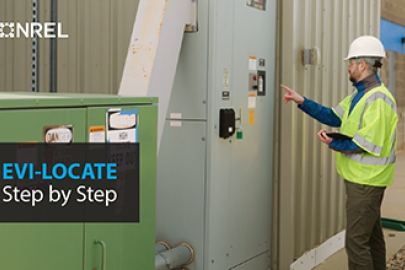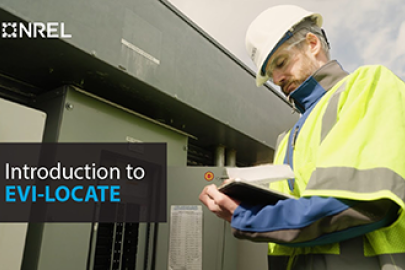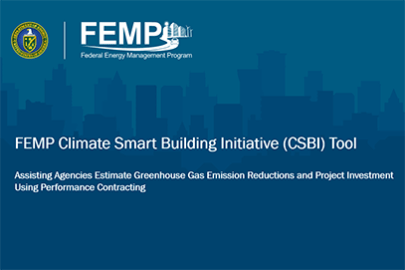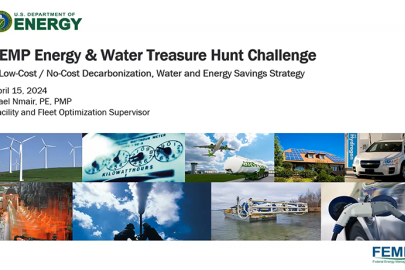This training focuses on Air Source Heat Pumps, and covers why efficient heat pumps can be a good choice, how to select a model that meets federal energy efficiency requirements, and how to buy the right model for your purpose.
Federal Energy Management Program
April 24, 2023Got five minutes? The Take Five training series has you covered with very short trainings in buying clean, efficient goods and services for the federal government while doing your part to reduce carbon emissions.
This training focuses on air source heat pumps. It covers reasons that efficient heat pumps can be a great choice for federal facilities, ways to select a model meeting federal requirements, and ways to buy the chosen model.
Hello and welcome to Take Five, a series of quick lessons in buying clean, efficient goods and services. The federal government—the nation's largest energy consumer—can save taxpayer dollars, conserve agency budgets, and tackle climate change by buying these products. I'm Meena Venkatraman of Berkeley Lab, and today I'll show you how to find and acquire an all-electric heat pump, one of the most efficient, climate-friendly ways to heat and cool a small building.
In this training, you'll learn five things:
- Why a heat pump is a great choice
- Where to find more information about them
- Where to find models that comply with federal efficiency requirements
- How to select the model that fits your needs and
- How to buy the chosen model.
By the end, you will know how to buy a heat pump quickly and easily.
Federal agencies are required by law to buy energy-efficient products. Heat pumps are one of the most efficient ways to heat or cool a space. Today we're talking about an air source heat pump. It's the most common type, and it's fully electric—no natural gas, fuel oil, or propane needed.
You get year-round comfort—and energy and cost savings—over the 10-20 year lifetime of the heat pump.
Purchasing efficient, electric heat pumps can reduce the energy and emissions intensity of your site, helping your agency meet federal targets to address climate change.
The Federal Energy Management Program, or FEMP, provides federal agencies with information to manage federal energy use. You can visit FEMP's Web site to find out more about heat pumps and their benefits for a federal buyer. Here, you'll find helpful information including sample contract language for a solicitation, calculations of cost savings for a typical federal application, and user tips.
So how do you buy an efficient heat pump? The best place to start is the Sustainable Facilities Tool, or SFTool, developed by the General Services Administration (GSA).
In SFTool, under the Procure tab, navigate to the HVAC/mechanical products section to find the product page for air source heat pumps.
On this page, you can find more information about heat pumps relevant for a federal buyer.
This page also links to the ENERGY STAR page for heat pumps. The ENERGY STAR page lists certified energy-efficient products that meet those federal purchasing requirements.
When it comes to choosing a certified efficient product that fits your specific need, you have at least two options.
The quickest, easiest way is just choosing from ENERGY STAR's list of the most efficient commercially available products. These products are most likely to qualify for rebates and maximize your agency's value—in terms of the cost savings and the emissions reductions—from purchasing an efficient heat pump.
Alternatively, you can find the heat pump meeting your technical requirements on the product finder page. You can use these filters to specify the heating and cooling capacity that your facility needs, as well as the minimum efficiency to take advantage of any rebates or optimize for cost and emissions savings.
Here you'll find the latest rebates available based on your zip code. First, make sure your power provider is the one listed, and if your site buys from a federal power wholesaler, you may have to contact them directly to enquire about rebates.
Efficiency programs usually specify models or a minimum efficiency level that is eligible, in this case a minimum seasonal energy efficiency rating, or SEER, of 17 for heat pumps.
We'll go over the economic benefits of efficient products and how to calculate them in more detail during another training.
To give an example, if you are looking for a heat pump with a 5-ton cooling capacity, 2-ton heating capacity, and efficiency above 17 SEER, you can select these ranges and the relevant products will populate in the search results.
Once you've chosen a compliant product using the FEMP, SFTool and ENERGY STAR websites, the easiest way to complete the purchase is to request the product directly from your agency's or site's preferred HVAC vendor.
You can also go to GSA eBuy and enter the product to get a quote from multiple vendors.
If you want to take advantage of the convenience and guaranteed lowest price of GSA Multiple Award Schedules, the SFTool product page will take you to the list of vendors for that schedule on GSA Advantage, where you can find your preferred vendor and pull up their latest price list.If you want to conduct a solicitation, SFTool contains guidance and example contract language for specifying energy-efficient products.
Before finalizing the purchase, just make sure that it's the right ENERGY STAR-certified model.
Here's a summary of the resources we've gone over today—from FEMP, SFTool, and ENERGY STAR.
If you want to find out more about efficiency incentives, the best place is DSIRE, the Database for State Incentives for Renewable Energy.
When it comes to buying, these pages at GSA will help with two of the purchasing options we identified.
Heat pumps are among the most efficient, climate-friendly ways to heat and cool an office or other building. We've shown you where to learn about them, how to choose the right one for your situation, and buy it in several ways, including some with lowest-price guarantees.
Thanks for joining us for this edition of Take Five. We hope to see you again for other trainings such as these below. And thank you for doing your part to meet federal policy, save taxpayer dollars, and address climate change.
Download a one-page guide to buying a heat pump.
Learn more about Energy-Efficient Product Procurement Training for Federal Agencies.










